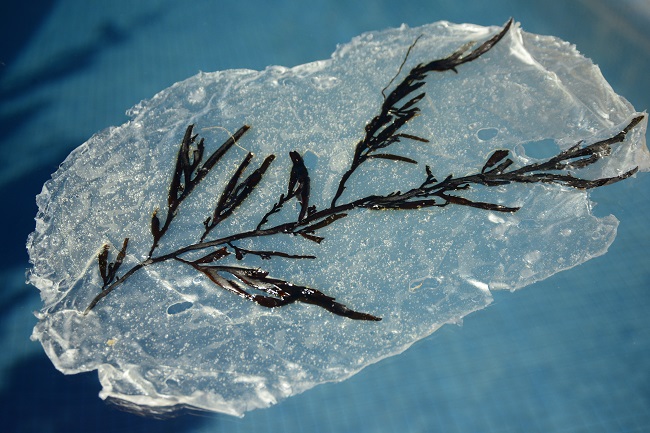
Project background.
Green Plastic – Blue Ocean is an interdisciplinary collaborative project between myself and Prof. Wei Zhang, director of the Centre for Marine Bio-products Development (CMBD), Flinders University College of Medicine and Public Health. We will experiment with future friendly bio-plastics generated from novel marine bio-polymer materials.
The word ‘plastic’ is problematic. Plastics are both useful and ubiquitous. Fossil fuel plastics are generally not readily bio-degradable, and this leads to the problem of plastic waste. Processing plastic waste is currently considered too difficult and expensive with technology available today. However, demand for plastics is rising. Microplastic health-related concerns are increasing due to food chain entry. Despite literature gaps, microplastics may be causing an increase in complications in multi-species diseases, cancer, and toxic effects due to bio-accumulation. The need to either reduce (difficult without legislation) or to replace non-degradable plastic is urgent.
We are also seeking insight toward human impetus as novel design requires cultural understanding. Working and building models together, we aim to develop questions, metaphors and realities, allowing us to rethink plastics.
How can we deal with the artificial environment humans have created? Can we reduce future impact upon society with next generation materials? How can we create cultural shifts to promote change and influence policy? If clean-up is impossible can we design with zero waste as our goal? How can we do better?
Seaweed (macro algae) polymers have unique properties which differ from terrestrial plant-based polymers. By utilising sustainably, seaweeds we will work with novel marine bio-materials to imagine and transition from petro-chemistry to green chemistry.
Plastic polymers derived from seaweed can be produced in forms that; are biodegradable, allowing nature to complete the carbon cycle by itself; contribute to carbon capture and storage.
Seaweed is probably one of the most prolific and underutilised renewable resources on the planet. Seaweeds grow faster than any land plant and provide benefits to the environment.
Through collaborative research and development between CMBD and myself, we aim explore the potential for marine seaweed bio-polymers whilst probing the world’s biggest ethical, environmental and technological challenges toward a more sustainable future for people, other species and ecologies.